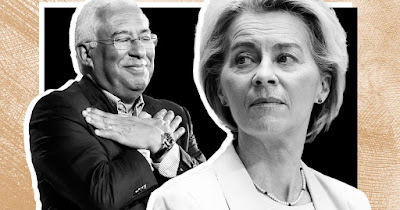June 17,
2024 : Want an EU top job? Have you asked the prosecutor?
Prosecutors
are still looking into allegations surrounding the frontrunners to lead the two
most important EU institutions.
June 17,
2024 4:00 am CET
By Jakob
Hanke Vela
BRUSSELS —
When EU leaders sit down on Monday to discuss who will take the EU’s top jobs,
two of the people under consideration will be facing legal probes.
As POLITICO
reported, the preferred names to sit at the EU’s top table are Germany’s Ursula
von der Leyen for a second term as European Commission president, Portugal’s
António Costa as European Council president, Malta’s Roberta Metsola as the
European Parliament boss, and Estonia’s Kaja Kallas as foreign policy chief.
The
parameters of how to assign leaders to these posts take into consideration
geographic diversity (i.e. Baltics vs Western Europe vs Southern Europe, for
example), gender balance and political affiliation.
Advertisement
Advertisement
What there
are no clear-cut guidelines for, though, are the legal problems of potential
candidates.
As it
happens, the frontrunners for both the European Council and European Commission
share one striking similarity: They are both the subject of ongoing
investigations.
Of course,
being a high-ranking politician can make you a target. Jean-Claude Juncker
served his term as Commission president despite coming under pressure over the
tax breaks companies received while he was president of Luxembourg — with
probes launched into whether a 2003 tax ruling in Juncker-run Luxembourg was so
generous to Amazon as to amount to illegal state aid.
Since then,
the Qatargate cash-for-influence scandal has raised the bar in Brussels, and in
the wake of European Parliament elections in which far-right groups made major
advances by campaigning against the rot within Europe’s mainstream parties,
judicial baggage could be a problem.
Here’s a
look at the probes being conducted into von der Leyen and Costa.
Ursula von
der Leyen
Von der
Leyen is still not in the clear over Pfizergate — a scandal over her failure to
disclose exchanges with the CEO of the pharmaceutical company.
Advertisement
Advertisement
The problems
of the Commission president, known by the three-letter acronym VDL, go back to
another three-letter acronym: SMS.
Ever since
her time at the German defense ministry, von der Leyen has run into trouble
over her use of text messages.
Before von
der Leyen was sent to Brussels, her defense ministry in Germany was facing a
Bundestag investigation for irregularities in contracts awarded to
consultancies — but when lawmakers requested to see her work phones as part of
an inquiry into those contracts, it was revealed that the phones had been
wiped.
Both
frontrunners are the subject of ongoing investigations. | Pool photo by Urs
Flueeler via AFP/Getty Images
Her more
recent scandal broke when the New York Times reported that von der Leyen had
exchanged text messages with Pfizer boss Albert Bourla in the run-up to the
EU’s biggest vaccine deal at the height of the Covid-19 pandemic. The newspaper
sued the Commission over its refusal to release those messages at the Court of
Justice of the EU.
Investigators
from the European Public Prosecutor’s Office have in recent months taken over a
probe stemming from a separate lawsuit against von der Leyen by Frédéric
Baldan, according to legal documents seen by POLITICO and a spokesperson from
the Liège prosecutor’s office.
Baldan sued
the Commission president, accusing her of “interference in public functions,
destruction of SMS, corruption and conflict of interest” — a hearing in that
case was postponed to December.
Advertisement
Advertisement
António
Costa
Former
Portuguese Prime Minister Costa is the clear frontrunner for the top post at
the European Council, but there are some in Brussels who are skeptical that
he’s the best man for the job.
While Costa
is well-liked by the EU’s heads of state and government and has a proven track
record as a skilled negotiator — the kind that is needed to unblock complex
Council discussions — he remains the subject of an ongoing legal probe back
home.
Costa has
not been formally charged with any crime, but remains under investigation as
part of the far-reaching influence-peddling probe that prompted his resignation
last November.
Prosecutors
have not dropped the investigation into Costa. | John Thys/AFP via Getty Images
Prosecutors
allege that members of Costa’s government tailored legislation to benefit the
backers of a state-of-the-art data center in Sines, in southern Portugal. The
then-prime minister’s name was mentioned by suspects in several wiretaps,
prompting prosecutors to look into what he may have known about the scheme.
The details
of the investigation into Costa remain classified; he denies any wrongdoing.
His
supporters in Lisbon and the EU bubble insist that the case against him is
weak, and say the fact that Portuguese prosecutors have not charged him with
any crime shows that they lack the evidence to do so.
But
prosecutors have also not dropped the investigation into Costa, and the
Portuguese candidate’s opponents say it would be a bad look for someone with
legal woes to end up in one of the EU’s most prestigious posts. That framing
may be used by Nordic countries seeking to boost the candidacy of Danish Prime
Minister Mette Frederiksen, who is considered to be more aligned with their
positions on defense and migration.
Stuart Lau
contributed to this article.



.jpg)



Sem comentários:
Enviar um comentário